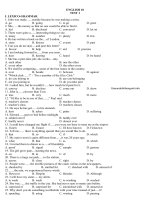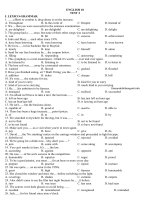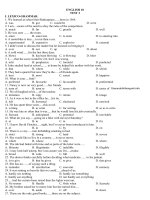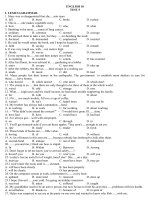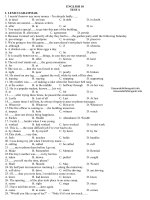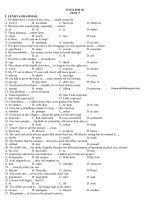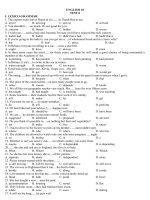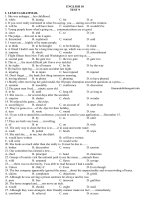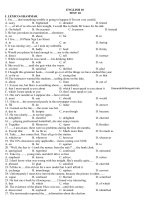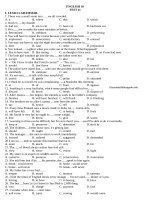Bài tập bổ trợ sách Friends Global 10
Bạn đang xem bản rút gọn của tài liệu. Xem và tải ngay bản đầy đủ của tài liệu tại đây (224.87 KB, 20 trang )
UNIT 1: FEELINGS
(Biên soạn Trần Trường Thành-Zalo 0369904425)
A. VOCABULARIES
New words (Từ mới)
No
Word
.
1. anxious
2. ashamed
3. bored
4. confused
5. cross
6. delighted
7. disappointed
8. embarrassed
9. envious
10. excited
11. frightened
12. proud
13. relieved
14. shocked
15. suspicious
16. upset
17. lottery
18. compare
19. level
20. result
21. interesting
22. unlucky
23. argument
24. tiring
25. moving
26. annoyed
27. injured
28. serious
29. unusual
30. medical
31. condition
32. pain
33. rare
34. trip
35. bruise
36. disorder
37. cure
38. amused
39. guilty
40. typical
Typ
e
adj
adj
adj
adj
adj
adj
adj
adj
adj
adj
adj
adj
adj
adj
adj
adj
n
v
n
n
adj
adj
n
adj
adj
adj
adj
adj
adj
adj
n
n
adj
v
n
n
n
adj
adj
adj
Pronunciation
/ˈæŋkʃəs/
/əˈʃeɪmd/
bɔːd/
/kənˈfjuːzd/
/krɒs/
/dɪˈlaɪtɪd/
/ˌdɪsəˈpɔɪntɪd/
/ɪmˈbærəst/
/ˈenviəs/
/ɪkˈsaɪtɪd/
/ˈfraɪtnd/
/praʊd/
/rɪˈliːvd/
/ʃɒkt/
/səˈspɪʃəs/
/ˌʌpˈset/
/ˈlɒtəri/
kəmˈpeə(r)/
/ˈlevl/
/rɪˈzʌlt/
/ˈɪntrəstɪŋ/
/ʌnˈlʌki/
/ˈɑːɡjumənt/
/ˈtaɪərɪŋ/
/ˈmuːvɪŋ/
/əˈnɔɪd/
/ˈɪndʒəd/
/ˈsɪəriəs/
/ʌnˈjuːʒuəl/
/ˈmedɪkl/
/kənˈdɪʃn/
/peɪn/
/reə(r)/
/trɪp/
/bruːz/
/dɪsˈɔːdə(r)/
/kjʊə(r)/
/əˈmjuːzd/
/ˈɡɪlti/
/ˈtɪpɪkl/
Meaning
lo lắng
ngượng ngùng, xấu hổ
buồn chán
bối rối
tức giận, bực mình
vui sướng, hạnh phúc
thất vọng
xấu hổ
ghen tỵ
hào hứng
sợ hãi
tự hào
nhẹ nhõm
sốc, ngạc nhiên
nghi ngờ
buồn bã, thất vọng
xổ số
so sánh
mức độ
kết quả
thú vị
không may mắn
tranh cãi, tranh luận
gây mệt mỏi
cảm động
bực mình, cáu giận
bị thương
nghiêm trọng
bất thường, lạ thường
thuộc về y tế
tình trạng, điều kiện
sự đau đớn
hiếm
vấp ngã
vết bầm tím
rối loạn
phương pháp cứu chữa
thấy hài hước, buồn cười
cảm thấy tội lỗi, ân hận
điển hình
41.
42.
43.
44.
45.
46.
47.
48.
49.
50.
polite
reserved
stereotype
expectation
manner
quality
aspect
mood
pleasure
value
adj
adj
n
n
n
n
n
n
n
v
Structures (Cấu trúc)
No
Structures
.
1. sense of humour
2. play a prank
3. die of something
4. be in danger
5. cheer up
/pəˈlaɪt/
/rɪˈzɜːvd/
/ˈsteriətaɪp/
/ˌekspekˈteɪʃn/
/ˈmỉnə(r)/
/ˈkwɒləti/
/ˈỉspekt/
/muːd/
/ˈpleʒə(r)/
/ˈvỉljuː/
lịch sự
dè dặt, kín đáo
định kiến, khuôn mẫu
sự mong chờ, mong đợi
hành vi, cử chỉ
phẩm chất
Khía cãnh
tâm trạng
niềm vui thích
trân trọng
Meaning
khiếu hài hước
chơi xỏ, trêu đùa
chết vì bệnh gì
gặp nguy hiểm
trở nên vui vẻ
Choose the correct answer.
Question 1. I entered the wrong room. I felt so ________.
A. delighted
B. embarrassed
Question 2. I was quite ________ about his being late.
A. annoyed
B. proud
Question 3. They were ________ at the result of the game.
A. disappointed
B. typical
B. GRAMMARS
I. Past simple
Past Simple (Quá khứ đơn)
Công thức
(+ S + V(-ed/ cột 2)
)
(-) S + didn't + V nguyên
(? Did + S + V nguyên?
)
Cách dùng
- Diễn tả một hành động xảy ra và chấm dứt hoàn toàn trong quá khứ.
E.g: My mother left this city 2 years ago.
- Diễn đạt các hành động xảy ra liên tiếp trong quá khứ
E.g: She came home, switched on the computer and checked her e-mails.
Dấu hiệu
- last night/ year/ month, yesterday, ago (2 years ago), in + năm trong quá khứ (in
1999)
II. Wh-question
Một số từ để hỏi như
- When (khi nào)
- What (cái gì)
- How many (bao nhiêu) ....
E.g:
How did you get there?
- How (như thế nào, bằng cách nào)
- Why (tại sao)
III. Adjectives of attitude or Adjectives ending in “-ing” or “-ed”
1. Một số động từ khi thêm “-ing” hoặc “-ed” được dùng như tính từ. Các tính từ tận
cùng “-ing” và “-ed” thường có ý nghĩa tương tự, nhưng cách dùng thì khác nhau.
E.g:
Learning English is interesting.
Many students are interested in learning English.
(thường dùng cho vật hoặc sự việc).
Adj “(interestin thường có ý nghĩa
ing”
Adj “ed”
g)
“gây ra”
(interested thường có ý nghĩa
)
“bị/ được”
(thường dùng cho người).
2. Một số tính từ tận cùng “-ing” và “-ed” thường gặp:
Verb (Động từ)
Adjectives (Tính từ)
amaze
amazing
/ amazed
amuse
amusing
/ amused
bore
boring
/ bored
confuse
confusing
/ confused
disappointin /
disappoint
g
disappointed
excite
exciting
/ excited
fascinate
fascinating
/ fascinated
frighten
frightening
/ frightened
interest
interesting
/ interested
please
pleasing
/ pleased
shock
shocking
/ shocked
surprise
surprising
/ surprised
tire
tiring
/ tired
worry
worrying
/ worried
Meaning (Nghĩa)
kinh ngạc
vui nhộn
buồn chán
rối trí, khó hiểu
thất vọng
hồi hộp, kích động
hấp dẫn
sợ hãi
hay, thú vị
hài lịng
chống, sốc
ngạc nhiên
mệt nhọc
lo lắng
Circle the correct answer.
Question 1. She doesn’t/ didn’t call me last night, which was really disappointing.
Question 2. The book was so interested/ interesting that she read it twice.
C. PHONETICS
Rules of pronunciation –ed (Quy tắc phát âm –ed)
-ed được
phát âm
Khi tận cùng của từ là
là
t hoặc d
/id/
Mẹo: trà đá
/t/
ch, x, gh, c, p, k, f, ss, sh
Mẹo: chàng xuống ghềnh có phà khơng fải sợ
Ví dụ
added, wanted
brushed, looked,
missed
involved, planned,
played
ssơng shâu
/d/
Các âm hữu thanh cịn lại
Ngoại lệ
- Chú ý các từ có đi –ed sau ln được phát âm là /id/
Một số từ kết thúc bằng -ed được dùng làm tính từ/danh từ, đi -ed được phát
âm là /id/.
No.
Word
Meaning
cao
tuổi, lớn tuổi
1
aged / eɪdʒid /(a)
trở nên già, làm cho
aged
/ eɪdʒd /
2
già cỗi
(Vpast)
3
4
5
6
7
8
9
10
11
12
blessed /blesid/ (a)
crooked / krʊkid/(a)
dogged / dɒɡdi /(a)
naked /neikid/(a)
learned / lɜːnid /(a)
learned / lɜːnd /
(Vpast)
ragged / ræɡid /(a)
wicked /wikid/(a)
wretched / ˈretʃɪd /
(a)
beloved /bɪˈlʌvɪd /
(a)
cursed / kɜːst /(a)
rugged / ˈrʌɡɪd /(a)
sacred / ˈseɪkrɪd /(a)
legged / ˈleɡɪd /(a)
hatred / ˈheɪtrɪd /(a)
13
14
15
16
17
crabbed / kræbid /(a)
18
- Chú ý những từ sau –ed được phát âm là /d/
ploughed, bathed, breathed, weighed
thần
thánh,
thiêng
liêng
cong, oằn, vặn vẹo
gan góc, gan lì, bền bỉ
trơ trụi, trần truồng
có học thức, uyên bác
học
rách tả tơi, bù xù
u thương
tức giận, khó chịu
xù xì, gồ ghề
thiêng liêng, trân trọng
có chân
tinh qi, ranh mãnh
khốn khổ, bần cùng, tồi
tệ
lịng hận thù
càu nhàu, gắt gỏng
PHONETICS
Exercise 1. Put the words with the underlined part into the correct column.
annoyed
confused
fascinate
d
intereste
d
overwhel
med
excited
embarras
sed
relaxed
bored
terrifed
depresse
d
disappoi
nted
amused
tired
frightene
d
/t/
…………………………………
/d/
…………………………………
/id/
…………………………………
…………………………………
…………………………………
…………………………………
…………………………………
…………………………………
…………………………………
…………………………………
…………………………………
…………………………………
Exercise 2. Choose a word in each group with the different sound of the -ed ending
from the others.
1. A. exhausted
B. frustrated
C. interested
D. relaxed
2. A. amused
B. shocked
C. satisfed
D. ashamed
3. A. embarrassed
B. depressed
C. bored
D. relaxed
4. A. confused
B. interested
C. fascinated
D. disappointed
5. A. astonished
B. convinced
C. confused
D. touched
6.
A. believed
B. prepared
C. involved
D.
liked
7.
A. lifted
B. lasted
C. happened
D.
decided
8.
A. handicapped
B. advantaged
C. organized
D.
volunteered
9.
A. wanted
B. parked
C. stopped
D.
watched
10. A. laughed
B. passed
C. suggested
D. placed
Exercise 3. Choose the word in each group that has the different stress from the rest.
1. A. guilty
B. confused
C. injured
D. frightened
2. A. envious
B. embarrassed
C. suspicious
D. unusual
3. A. emotions
B. graduation
C. refuse
D. collector
4. A. moving
B. embarrass
C. medical
D. holiday
5. A. danger
B. medical
C. condition
D. ankle
6. A. advice
B. revision
C. genetic
D. problem
7. A. unusual
B. major
C. problem
D. ferry
8. A. result
B. manner
C. aspect
D. humour
9. A. reality
B. stereotype
C. typical
D. majority
10:
A. landscape
B. delighted
C. ocean D. feeling
VOCABULARY AND GRAMMAR
Exercise 1. Complete the sentences with the below.
relieved
1.
2.
3.
4.
bored
suspiciou
confused
ashamed
anxious
s
envious
upset
delighted
frightene
cross
embarras
Mum will be _________________ when she fnds out about
d the broken vase.
sed
We had a(n) _________________ couple of weeks waiting for the test results.
All the roads looked the same and he felt thoroughly _________________.
Andrea was _________________ at the chance to go to the Bolshoi ballet.
5. Michelle was very _________________ at having to ask her parents for money.
6. The police were _________________ of Rob because his story did not quite make sense.
7. Susan was _________________ to learn that her mother’s illness was not a serious one.
8. Everyone cries sometimes - it’s nothing to be _________________ of.
9. She’s still deeply _________________ about her uncle’s death.
10. I was _________________ of being left by myself in the house when I very young.
11. I see people who have opportunities I don't have, and I get _________________.
12. Julia soon got _________________ with lying on the beach, and then she took a swim in the sea.
Exercise 2. Complete the sentences with the words below.
bumped
broke
1.
2.
3.
4.
5.
6.
7.
8.
survived
twisted
injured
rescued
scratched
escaped
Sue _________________ her ankle and now it’s very swollen.
Nam fell out of a tree and _________________ his arm.
Only two people _________________ the plane crash.
The tree crashed to the ground and _________________ a man walking a dog.
The man jumped into the pool and _________________ the drowning girl.
Luckily, the family _________________ from the fre.
Tom _________________ his leg on some of rose bushes.
Ken _________________ his head on a branch.
Exercise 3. Choose the word /phrase (A, B, C or D) that best fts the blank space in
each sentence.
1. I was _______ when I got my results. I passed, but I thought I’d do better.
A. delighted
B. amused
C. envious
D. suspicious
2. I was _______ when my dad shouted at me.
A. shocked
B. disappointed
C. unhappy
D. anxious
3. Paula was ________ because her parents gave her sister a bigger present.
A. proud
B. jealous
C. excited
D. ashamed
4. I felt ________ to fnd my wallet in the café where I had left it.
A. relieved
B. shocked
C. embarrassed
D. confused
5. He’s an/ a _______ man. He makes me laugh.
A. relieved
B. unusual
C. happy
D. amusing
6. David missed his family and his friends. He felt really _______.
A. interesting
B. tiring
C. homesick
D. unlucky
7. The children were _______ that they had behaved so badly.
A. ashamed
B. serious
C. moving
D. rare
8. Brian looks very _______. Has he done something wrong?
A. polite
B. moving
C. embarrassed
D. reserved
9. We were very _______ when we saw the accident.
A. annoyed
B. shocked
C. unhappy
D. homesick
10. It’s really hard to write because my wrist really _______.
A. bruises
B. burns
C. cuts
D. hurts
11. Paul _______ over on the ice yesterday and injured his leg.
A. injured
B. slipped
C. broke
D. hit
12. Phong _______ his arm at the weekend, so he can’t come to school today.
A. injured
B. fell
C. sprained
D. shocked
13. The knife is very sharp. Be careful or you’ll _______ yourself.
A. burn
B. cut
C. break
D. fall
14. Look at this! I cut myself and _______ all over my sleeves.
A. broke
B. burned
C. bled
D. tripped
15. I can’t walk very fast because I _______ my ankle yesterday.
A. broke
B. cut
C. slipped
D. sprained
16. That cable is very dangerous. Someone might _______ over it.
A. sprain
B. hurt
C. break
D. trip
17. That kettle is very hot — be careful! Don’t _______ yourself.
A. break
B. burn
C. cut
D. slip
18. I have a few _______ and my arm hurts, but nothing serious.
A. bruises
B. compares
C. falls
D. blood
19. I’ve a _______ in my back and I need to lie down.
A. pain
B. burn
C. sprain
D. cure
20. I always felt I was a _______ to my parents.
A. disappoint
B. disappointed
C. disappointment
D. disappointingly
21. Like a lot of men, he fnds it hard to express his _______ as he is distressed.
A. emotions
B. delight
C. winner
D. return
22. I her _______ to talk to people she's never met before.
A. enviable
B. envy
C. envious
D. enviously
23. I was _______ that I'd made so little effort.
A. shaming
B. ashaming
C. shamed
D. ashamed
24. I always felt I was a _______ to my parents.
A. disappoint
B. disappointed
C. disappointment
D. disappointingly
25. Sometimes, _______, it's hard to remember her face at all.
A. frighteningly
B. frighten
C. frightening
D. frightened
26. I might _______ injured and have even more pain unless I went on trying to repair my broken
car.
A. get
B. have
C. take
D. make
27. She felt _______ about undressing in front of the doctor.
A. embarrass
B. embarrassingly
C. embarrassment
D. embarrassed
28. The children had an _______ about what game to play.
A. argue
B. arguing
C. argument
D. arguably
29. That is monstrous, but it does not _______ me.
A. astonish
B. astonished
C. astonishing
D. astonishment
30. _______ disorders occur when a mutation affects your genes .
A. Genes
B. Genesis
C. Generic
D. Genetic
31. Without more food and _______ supplies, these people will surely not survive.
A. medicine
B. medical
C. medic
D. medicate
32. Are you doing anything _______ this weekend?
A. exciting
B. excited
C. excitement
D. excitingly
33. The four levels _______ happiness represent your personal priorities and how you relate to
others.
A. for
B. to
C. of
D. with
34. She died _______ a heart attrack as she was trying to carry a heavy box.
A. of
B. for
C. to
D. on
35. He drove so fast that I really felt my life was _______ danger.
A. out of
B. in
C. for
D. about
36. The drought has made farmers anxious _______ the harvest.
A. about
B. to
C. up
D. of
37. He dropped a quarter _______ the slot and waited for something to happen.
A. to
B. for
C. a
D. into
38. “Lorna graduated _______ Freiburg University.” Kate said.
A. from
B. on
C. of
D. for
39. Every time, I went home alone. I felt my life was _______ danger.
A. of
B. for
C. with
D. in
40. Feeling depressed is nothing to be ashamed _______.
A. of
B. in
C. for
D. about
41. I ____________ late this morning because my alarm didn’t go off.
A. get up
B. got up
C. getting up
D. gets up
42. It __________ heavily the day before yesterday.
A. rain
B. rains
C. raining
D. rained
43. My computer ___________ broken last week.
A. was
B. were
C. had been
D. has been
44. He _____________ me a big teddy bear on my birthday last week.
A. buyed
B. buys
C. bought
D. buying
45. ________________ in this mansion 5 years ago?
A. Did you live
B. You lived
C. Have you lived
D. Did you lived
46. She ________ the gold medal in 1986.
A. won
B. win
C. to won
D. to win
47. There ____________ some big trees in the yard when I was 5.
A. is
B. are
C. was
D. were
48. For a long time people ________ that the world was flat and that people could fall off the
edge.
A. may think
B. thought
C. are thought
D. thinks
49. Nick: “I last _______ Susan at her house two _______ ago.”
A. saw/ year
B. seen/ week
C. see/ months.
D. saw/ months.
50. Jack: “What did you ______ last night?” Jeremy: “I ______ on my Science project.”
A. do/ works
B. do/ worked
C. doing/ working
D. does/ works
Exercise 4. Mark the letter A, B, C, or D on your answer sheet to indicate the word(s)
CLOSEST in meaning to the underlined word(s) in each of the following questions.
1. I fnd some of Brahms’s music deeply moving.
A. motioning
B. unaffecting
C. nice
D. emotional
2. It was only later in life that she found happiness and peace of mind.
A. hurt
B. anxiety
C. joyfulness
D. relieve
3. He was ashamed to admit to his mistake.
A. shameless
B. honest
C. suspicious
D. guilty
4. Several train passengers sustained serious injuries in the crash.
A. recovery
B. illness
C. harm
D. excitement
5. You can also pass an exam and feel like you've hit the jackpot.
A. get over
B. fail
C. travel
D. search for
6. One or two players who think that they might be in danger of not being in the squad have a
chance to play.
A. dangerous
B. anxious
C. joyful
D. vulnerable
7. You may not get injured if you fall on rubber flooring.
A. wounded
B. calm
8. Success like that is extremely rare.
A. wonderful
B. delighted
C. suspicious
D. hurtless
C. uncommon
D. popular
Exercise 5. Mark the letter A, B, C, or D on your answer sheet to indicate the word(s)
OPPOSITE in meaning to the underlined word(s) in each of the following questions.
1. He lost his temper and shouted at me.
A. calm down
B. show off
C. cool
D. angry
2. Pat was delighted with her new house.
A. happy
B. unpleased
C. satisfed
D. envious
3. I was so proud that my son had been chosen for the national team.
A. superior
B. supportive
C. defending
D. humble
4. She said she did not care about it, but I believe she was secretly delighted.
A. privately
B. absolutely
C. publicly
D. extremely
5. He was getting bored doing the same thing every day.
A. tired
B. obedient
C. shocked
D. excited
6. He was disappointed to fnd they'd already left.
A. upset
B. distressed
C. satisfed
D. envious
7. We'd been in the house a month when dark stains started appearing on the wall.
A. show up
B. paint
C. lean
D. disappear
8. He died of a suspected heart attack at age 87.
A. doubtful
B. trusting
C. suspicious
D. Pain
Exercise 6. Choose the correct adjectives.
1. I worked hard last term, but my exam results were disappointed/ disappointing.
2. It was an exhausted/ exhausting tennis match, but he won in the end.
3. I’ll be surprised/ surprising if Viet Nam win the World Cup.
4. I don’t like this flm. It’s bored/ boring.
5. This TV programme is very interested/ interesting.
6. I forgot her name. It was really embarrassed/ embarrassing.
7. I’m really annoyed/ annoying because I can’t fnd my mobile phone.
8. I love parties. They’re really excited/ exciting.
9. We really enjoyed the flm. It was very entertained/ entertaining.
10. Mai had studied hard for her exams and her results were very satisfed/ satisfying.
11. The children were fascinated/ fascinating by the clown’s performance.
12. This weather is very depressed/ depressing. It really gets me down.
Exercise 7. Choose the correct words.
1. When I got home, there was a burglar in the kitchen. What/ How a shock!
2. I failed all of my exams. What/ How a disaster!
3. Why don’t we have a party at the end of term? What/ How a great idea!
4. My dad is going to buy me a new phone. What/ How wonderful!
5. My brother fell asleep in the middle of an interview. What/ How funny!
6. He got lost in the centre of Bangkok. What/ How a nightmare!
7. My uncle’s house burned down in a fre. What/ How terrible!
8. I keep getting text messages from somebody I don’t know. What/ How strange!
Exercise 8. Complete the sentences with the -ed or -ing form of the verbs in brackets.
1. She’s very ________________ with her new laptop.
(please)
2. He was very ________________ when his best friend didn’t give him a birthday present.
(disappoint)
3. The weather’s really ________________. It’s raining today and it rained yesterday, too.
(depress)
4. That flm is really ________________. I laughed all the way through it.
(amuse)
5. It’s Sunday afternoon and Sue’s got nothing to do. She’s really ________________. (bore)
6. That maths question was really ________________.
(confuse)
7. He’s ________________. He passed his driving test this morning
(delight)
8. They’re going to watch their favourite group at a concert tonight. They’re very
________________.
(excite)
Exercise 9. Fill in each gap with an appropriate preposition.
1. She goes out partying ____________ her friends every weekend.
2. She couldn't help dropping ____________ a Geordie accent
3. How to get a reply ____________ Santa to your children's Christmas letters
4. Do not be anxious ____________ anything, but in everything by prayer and supplication with
thanksgiving let your requests be made known to God.
5. Someone is so excited ____________ Tet holiday.
6. I still think of her ____________ time ____________ time.
7. It is a brave person who will die ____________ their beliefs.
8. We're all ____________ danger ____________ losing our jobs.
9. His lively sense ____________ humour helps to keep the lab very cheerful.
10. The manager insisted ____________ John’s ability to learn.
Exercise 10. Complete the sentences with the appropriate form of the words in
parentheses.
1. My friend’s ________________ was due to the death of her grandfather.
(sad)
2. Robert accepted the offer without ________________.
(hesitate)
3. Having just seen a short flm about poor children in Vietnam, they are so ________________.
(move).
4. He lost a lot of ________________ in the accident.
(bleed)
5. The athlete wore his medal with ________________.
(proud)
6. They thanked Ann for her ________________.
(kind)
7. This is the most ________________ experience of my life.
(frighten)
8. I get ________________ out of dancing.
(enjoy)
9. Children normally feel a lot of ________________ about their frst day at school.
(anxious)
10. The man hid his face to cover his ________________.
(embarrass)
11. The idea was slow to fnd general ________________.
(accept)
12. Will you join me in wishing the bride and groom every ________________?
(happy)
13. She felt ________________ about undressing in front of the doctor.
(embarrass)
14. There seems to be some ________________ over the exam dates.
(confuse)
15. Some youths commit acts of vandalism out of ________________.
(bored)
16. He was forced to make several ________________ to his speech.
(revise)
17. The restaurant turned out to be ________________ cheap.
(surprise)
18. They don't seem particularly ________________ about the situation.
(worry)
19. The doctor told me that I had a serious ________________ problem that I hadn’t realized.
(medicine)
20. The little boy got ________________ because the journey was too long and tiring.
(bore)
21. When I was walking on the beach, I was ________________ to fnd a big bottle in the sand.
(surprise)
22. My little sister feels very proud of herself because she won a singing ________________
yesterday.
(compete)
23. Newspapers and TV stations became ________________ in that famous singer’s private life.
(interest)
24. Look! The kitchen is in a ________________ state when she left.
(disgust)
25. The child felt ________________ because it was dark in the house and she was with no one
else.
(frighten)
LISTENING
Exercise 1. LISTEN to audio 1.08 and WRITE T (True) or F (False)
statements (a-f).
a) Louis fnished the project and decided to watch football.
b) Matt apologized to Toby and Toby is not mad at him anymore.
c) Ryan and Brandon both like a girl whose name is Amy.
d) Ryan is embarrassed and ask a friend to speak with Brandon.
e) Marcus refused Alex’s offer and didn’t borrow him 10$.
f) Marcus listened to Alex’s advice and told Jack a lie.
for the following
___________
___________
___________
___________
___________
___________
Exercise 2. LISTEN to audio 1.07 and CHOOSE A, B, C, or D for the following questions.
(2đ)
1. What does Zak need to do?
A. some division
B. some remission
C. some revision
D. some decision
2. When is Zak’s exams?
A. next month
B. six weeks more
C. both are wrong
D. both are correct
3. Why does Zak always do badly in exams?
A. because he is panic
B. because he is calm C. because he is stupid
D. because he is lazy
4. What does Zak want to do in the end?
A. stop working and rest for a bit
B. fnish reviewing for the test
C. come with Tom into town
D. continue speaking with Tom
SPEAKING
Exercise 1. Complete the dialogue with the questions below.
- What did you watch?
- What did you do on Sunday?
- Did you have a good weekend?
- What did you do on Saturday?
- What did you read?
Phon (1) __________________________________
g:
Nick: Yes, I did.
Phon (2) __________________________________
g:
Nick: I read a book.
Phon (3) __________________________________
g:
Nick: A detective story.
Phon (4) __________________________________
g:
Nick: I stayed in and watched TV.
Phon (5) __________________________________
g:
Nick: A volleyball match and a flm.
Exercise 2. Complete the dialogue with the sentences below.
A. Where did you go?
B. I played computer games at home.
C. What did you see?
D. Bio Shock. It was great.
E. What did you get up to at the weekend?
Phon Hi, Nick. How was your weekend?
g:
Nick: It was good. I went to the cinema on Saturday.
Phon (1) __________________________________
g:
Nick: The new Marvel flm.
Phon Cool. What did you do on Sunday?
g:
Nick:
Phon
g:
Nick:
Phon
g:
Nick:
Phon
g
Nick:
Phon
g:
Nothing much. I stayed at home and revised. What about you? (2)
__________________________________
I went out with some friends on Saturday.
(3) __________________________________
To the park near my house.
No way! What about on Sunday?
(4) __________________________________
What did you play?
(5) __________________________________
READING
Exercise 1. Read the text, and decide whether the sentences are true (T) or false (F).
I’ve Been Here Before! It’s a strange sensation. A new place that seems familiar or an event that
you’re sure has happened before. How many of us have had this experience? Apparently, over
70%. It’s called déjà vu and according to the experts is not something new y but has been
happening to people for hundreds of years.
So, what explanations are there for this strange feeling that is both confusing and
uncomfortable? Some scientists think that it is related to dreams and memory. It appears that
although the majority of us cannot recall our dreams, we actually store the memory of dreams in
our long-term memory. This deep memory can come back sometimes when we are in a similar
situation and makes us think that we have done this before.
However, as usual, not all experts agree. Those who believe in reincarnation - the idea that we
have all lived before - say that these feelings are fragments of memories from previous lives.
But, whatever the reason for déjà vu, one thing it shows is how complicated and amazing our
brains are and that we are a long way from understanding completely how the brain, and in
particular, how our memories work.
1. Déjà vu is the feeling that something familiar is unfamiliar.
________
2. People have been experiencing déjà vu for the last hundred years.
________
3. Some people think that déjà vu is related to dreams we can’t remember.
________
4. Some people think that this is not our frst or only life.
________
5. Soon we will understand how our brains work.
________
Exercise 2. Read the following passage and mark the letter A, B, C, or D to choose the
word or phrase that best fts each of the numbered blanks from 21 to 25.
HOW FOREIGNERS SEE THE BRITISH?
What is a typical British person like? People who come to Britain from other countries
probably have a few expectations: British people are polite, rather reserved, and enjoy drinking
tea and standing in queues! But how accurate is this (1) _________? In an online survey of 1,402
foreign nationals living in the UK, just over half said that the British (2) _________ their
expectations.
The survey also asked which aspects of the British character the foreign nationals liked and
disliked. British people’s good (3) _________ were popular with 49% and 40% liked the ability to
queue. Many agreed that the British are reserved and for 32% this was a good (4) _________ -but
for 19% it was negative. Other negative aspects were the British sense of humour (31%) and
British culture in general (28%). However, 77% said they liked British people in general and 61%
said that their (5) _________ of the British got better as a result of living in the UK.
1.
2.
3.
4.
5.
A.
A.
A.
A.
A.
stereotype
connected
moments
perception
concept
B.
B.
B.
B.
B.
(Adapted from English 10 Friends Global by Vu My Lan et al)
qualifcation
C. property
D. argument
drew
C. matched
D. spread
manners
C. memories
D. movements
quality
C. problem
D. occurrence
defnition
C. image
D. opinion
Exercise 3. Read the following passage and mark the letter A, B, c, or D to indicate the
correct answer to each of the questions from 1 to 5.
All children hurt themselves from time to time. But when thirteen-year-old Ashlyn Blocker gets
injured, she doesn’t realise it. Once, when she burned herself, she only knew about it when she
looked at her skin. There was always something different about Ashlyn.
As a baby, she didn't cry. When she was eight months old, her parents noticed there was
some blood in her eye, so they took her to see a doctor. The doctor found a serious cut in her eye
and was shocked. Why didn’t the baby cry? Tests showed that Ashlyn had a very unusual medical
condition: she couldn’t feel any pain. This condition is very rare: many people who have it die of
it. Pain is a natural warning that you’re ill or injured. People who can’t feel pain just don’t realise
they’re in danger.
The frst few years of Ashlyn’s life were very difficult. She often tripped and injured herself.
Once, she broke her ankle but she didn’t stop running. During school breaks, one teacher
watched Ashlyn all the time in the playground and they had to search for cuts, bruises or other
injuries. When she was fve, Ashlyn’s story appeared in newspapers and on TV. Scientists studied
her condition and found she has a genetic disorder that means pain signals do not reach her
brain. Unfortunately, at the moment, there is no hope of a cure. And, as Ashlyn knows, a life
without pain is both difficult and dangerous.
(Adapted from English 10 Friends Global by Vu My Lan et al)
1. Which best serves as the title for the passage?
A. A Girl with a Strong Mind
B. Education Programmes for the Disabled
C. A Normal Student Struggles to Live
D. A life without Pain
2. According to paragraph 1, what’s strange about Ashlyn Blocker?
A. She can’t feel her pain.
B. She’s very sensitive to injuries.
C. She often looks at her skin.
D. She likes to bum herself.
3. The word noticed in paragraph 2 is closest in meaning to _______.
A. displayed
B. expressed
C. recognised
D. developed
4. The word it in paragraph 2 refers to_______.
A. pain
B. condition
C. warning
D. danger
5. Which of the following is NOT true, according to the passage?
A. There’s already a cure for Ashlyn’s medical condition.
B. Pain is a natural signal of illness or injuries.
C. The frst few years of Ashlyn’s life were challenging.
D. Ashlyn’s story was spread on TV and in newspapers.
WRITING
Exercise 1. Put the words in the correct order to make questions. Then write true
answers.
1. last/ what/ you / did / night / do /?
_______________________________________________________________________________________
2. last / you / what / do / did / Sunday /?
_______________________________________________________________________________________
3. do / on your last birthday / did / what / you /?
_______________________________________________________________________________________
4. you / how many hours / last night / did / sleep /?
_______________________________________________________________________________________
5. did / last summer / where / go / you / on holiday /?
_______________________________________________________________________________________
Exercise 2. Write questions in the past simple for these answers.
1. He sailed around the world with his best friend.
(who?)
_______________________________________________________________________________________
2. He scored fve goals in the match.
(how many?)
_______________________________________________________________________________________
3. I learned to swim when I was fve.
(when?)
_______________________________________________________________________________________
4. They had the speaking competition in Ha Noi last year.
(where?)
_______________________________________________________________________________________
5. He didn’t tell the answer to the teacher because he was very shy.
(why?)
_______________________________________________________________________________________
Exercise 3. Rewrite the sentences. Use the words in bracket
1. I don’t like spiders.
(afraid)
I’m ___________________________________________________________________________________
2. He knew he shouldn’t have stolen it.
(guilty)
He felt _______________________________________________________________________________
3. Did your exam results please you?
(satisfed)
Were you ____________________________________________________________________________
4. What don’t you understand?
(confused)
What are you _______________________________________________________________________
5. They’re annoying him.
(irritated)
He’s getting_________________________________________________________________________
6. I fell happy that I got good exam results.
(pleased)
I’m ___________________________________________________________________________________
7. They didn’t like the bad weather.
(fed up)
They were ___________________________________________________________________________
8. She doesn’t like her sister.
(jealous)
She’s ________________________________________________________________________________
9. Why are you sad?
(depressed)
What are ____________________________________________________________________________
10. Did the zombies frighten you?
(scared)
Were you ____________________________________________________________________________
Exercise 4. Complete the narrative with the clauses below
a. I discovered that I had accidentally thrown my ticket away
b. We went out in the evening
c. none of us had found out the coach times
d. but it turned out to be a disaster
e. We sat down on the beach
f. We set off early in the morning
A terrible day out
Last August, some friends and I decided to go to Vung Tau for the day. It was supposed to be a
fun day out, (1) ________________________________!
(2) ________________________________, since we wanted to spend as much time as possible on the
beach. However, (3) ________________________________, so we spent two hours waiting at the
coach station. It was nearly midday by the time we arrived at our destination.
(4) ________________________________but within a few minutes, it started to rain. After an hour, we
gave up and decided to go home. At the station, (5) ________________________________so I had to
buy another one!
It really was a terrible day. However, (6) ________________________________and had a better time.
Exercise 5. Read the narrative. Put the paragraphs in the correct order, and then
complete the chart with the underlined time expressions in the text.
A Suddenly, I felt a pain in my right foot. My grandmother had told us that
there were some dangerous fsh near the beach. She said that these fsh
had stung several swimmers recently, I felt guilty that I hadn’t put my
B
C
D
beach shoes on and I started to cry.
In the end, my foot stopped hurting and I felt very relieved. Finally, I went
back to sit with my grandparents on the beach. I didn’t go into the sea
again that day, and it was the last time I ever walked on the beach with
no shoes.
Last summer, I was in Nha Trang with my family visiting my
grandparents. One day, we decided to go to the coast. We drove to the
nearest beach, and put on our swimming costumes. ‘Don’t forget your
beach shoes,’ said my mum, But I didn’t listen and ran straight into the
sea.
At frst, my mother thought I had cut myself on a piece of glass, but then
I showed her my foot. There were four small holes where the fsh had
stung me. We went and asked a lifeguard for help. He told me to sit
down, and a few minutes later, he brought a bowl of hot water and told
me to put my foot in it. Apparently, the hot water brings the poison out of
the foot.
1. _____________
2. _____________
To start a narrative
To show how a situation changes with time
To show a surprise event
To move the narrative forward in time
To end a narrative
3. _____________
(1)
(2)
(3)
(4)
(5)
(6)
(7)
(8)
4. _____________
_______________________,
_______________________,
_______________________,
_______________________,
_______________________,
_______________________,
_______________________,
_______________________,
Mark the letter A, B, C, or D to indicate the word whose underlined part differs from
the other three in pronunciation in each of the following questions.
Question 1.A. mutual
B. untidy
C. university
D. uniform
Question 2.
A. embarrassed
B. delighted
C. excited
D.
interested
Mark the letter A, B, C, or D to indicate the word that differs from the other three in
the position of the primary stress in each of the following questions.
Question 3.A. station
B. anxious
C. smartphone
D. upset
Question 4.A. important
B. difficult
C. suspicious
D. amazing
Mark the letter A, B, C, or D to indicate the correct answer to each of the following
questions.
Question 5. My dad started to dance at my birthday party and all my friends saw him and
laughed. I was so ________!
A. delighted
B. embarrassed
C. frightened
D. interested
Question 6. Everyone is so ________ of my best friend because she has the chance to study
abroad at one of the most prestigious universities.
A. ashamed
B. relieved
C. envious
D. disappointed
Question 7. She was emotionally________, and the strain was beginning to affect her job.
A. exhausted
B. dependent
C. satisfed
D. surprised
Question 8. Travellers to the country have been urged to avoid large crowds, which have
occasionally turned ________ in the past.
A. personal
B. violent
C. careless
D. famous
Question 9. Discussions were interrupted by the ________ that the factory had to close.
A. behavior
B. display
C. announcement
D. audience
Question 10. Denise sometimes feels very________, but she tries to stay optimistic every day
and fnds new ways to solve problems.
A. active
B. discouraged
C. amazed
D. creative
Question 11. Can you ________ me a call tomorrow? I’ll have more time to talk then.
A. have
B. tell
C. give
D. take
Question 12. No system is designed to cope ________ the floods we have had this year.
A. at
B. of
C. in
D. with
Question 13. Normally I spend two hours ________ my homework, but last night it took me more
than three hours to complete all my tasks.
A. do
B. doing
C. to do
D. done
Question 14. Zax ________ to go out with Tom because he’s disappointed about his exam results.
A. divides
B. refuses
C. affords
D. plays
Mark the letter A, B, C, or D on your answer sheet to indicate the most suitable
response to complete each of the following exchanges.
Question 15.
Tom: “That’s a wonderful party.”
Kane: “________”
A. Sorry to hear that
B. It’s nice of you to say so
C. Neither do I
D. I’m afraid not
Question 16.
Daniel: “Let’s go camping”.
Luke: “________. The weather is not so good today”
A. No problem
B. Just bring yourself
C. Oh, I don’t think it’s a good idea.
D. No thanks
Mark the letter A, B, C, or D to indicate the word(s) CLOSEST in meaning to the
underlined bold word(s) in each of the following questions.
Question 17. Lori is a good singer, but she always gets embarrassed if we ask her to sing.
A. shy
B. optional
C. angry
D. sorrowful
Question 18. Jeb has always thought Bob was a disgusting little man.
A. noisy
B. awful
C. beautiful
D. wonderful
Mark the letter A, B, C, or D to indicate the word(s) OPPOSITE in meaning to the
underlined bold word(s) in each of the following questions.
Question 19. Gibson met a clever classmate who had built his own radio transmitter.
A. thoughtful
B. diligent
C. harmful
D. foolish
Question 20. It is important that everyone should understand the risks involved in this plan.
A. respective
B. optional
C. insignifcant
D. agreeable
Read the following passage and mark the letter A, B, C, or D to choose the word or
phrase that best fts each of the numbered blanks from 21 to 25.
In 1990, Zoe Lemon was on a ferry, sailing from Hull in England to Germany. She was going on
holiday with her family. The journey was long and (21) ________ and ten-year-old Zoe soon got
bored. To (22) ________ the time, she decided to write a message in a bottle and drop it into the
sea. ‘It will be interesting if someone fnds it’, she thought. Then she forgot about the bottle
completely.
Twenty-three years later, she was amazed to get a reply from someone in the Netherlands. A
man was walking on the beach and was surprised (23) ________ Zoe’s bottle in the sand. He wrote
to the address on the message, where Zoe’s parents still live. Zoe was delighted, but it was also
very (24) ________ for her to see her message again after twenty-three years, and she cried when
she read it. ‘It’s astonishing that the bottle didn’t break’, said Zoe. Her fve-year-old son thinks it
is all very exciting and wants to put a message (25) ________ a bottle himself!
(Adapted from Solutions Pre-Intermediate by Tim Falla et al.)
Question 21.
satisfactory
Question 22.
Question 23.
found
Question 24.
moving
Question 25.
A. exciting
B. tiring
C. interesting D.
A. pass
A. founded
B. play
B. fnding
C. cut D. choose
C. to fnd
D.
A. helpful
B. complicated
C. boring
A. of
B. among
C. in
D.
D. on
Read the following passage and mark the letter A, B, C, or D to indicate the correct
answer to each of the questions from 26 to 30.
In 2008, Alex Lenkei had a problem with the bone in his arm and he needed a serious
operation. Normally, with an operation like that, the doctor gives the patient an anaesthetic so
that he or she doesn’t feel any pain. But Lenkei refused the anaesthetic. Instead, he hypnotised
himself and simply told himself that he could not feel any pain.
That took about thirty seconds. Then the operation started. According to Mr Lenkei, pain
signals do not reach his brain when he is hypnotised. The doctor, David Llewellyn-Clerk was a bit
worried. He had to take some bone from Lenkei’s arm. He watched Lenkei carefully during the
operation, as he wasn’t sure that Lenkei could feel no pain. ‘I didn’t think Mr Lenkei could hear
us,’ said Dr Llewellyn-Clerk, ‘but half way through the operation, he said “How’s it going?”’.
That’s when the doctor realised that Lenkei was not in pain. The operation lasted 83 minutes.
Mr Lenkei started hypnotising people when he was sixteen and is now an expert. It wasn’t his
frst operation without anaesthetic. In 1996, a friend hypnotised him before a thirty- minute
operation in his stomach. Both operations were successful, so Lenkei had a third operation
without anaesthetic in 2013, this time on his ankle, which also went well.
(Adapted from Solutions Pre-Intermediate by Tim Falla et al.)
Question 26. What is the best title for this text?
A. It didn’t hurt
B. Anaesthetic Methods
C. Lenkei’s records
D. Dr Llewellyn-Clerk - an expert in operations
Question 27. The word “That" in paragraph refers to_______.
A. hypnotizing
B. operation
C. watching the operation
D. giving an anaesthetic
Question 28. According to passage, why was Dr Llewellyn-Clerk worried?
A. Because he had to take some bone from Lenkei’s arm, and he wasn’t sure that Lenkei could
feel no pain.
B. Because pain signals do not reach Mr Lenkei’s brain when he is hypnotised.
C. Because he gave the patient an anaesthetic.
D. Because Lenkei had a third operation.
Question 29. The word realised in the passage is closest in meaning to _______.
A. understood
B. encouraged
C. forgot
D. failed
Question 30. Which of the following is TRUE, according to the passage?
A. A teacher hypnotised Lenkei before a thirty-minute operation in his stomach.
B. Mr Lenkei started hypnotising people when he was sixteen and he is now an expert.
C. Lenkei wanted the doctor to give him an aneasthetic so that he didn’t feel any pain.
D. Alex Lenkei didn’t have any problems with the bone in his arm.
Mark the letter A, B, C or D on your answer sheet to indicate the sentence that is
closest in meaning to each of the following questions.
Question 31. We have written to each other for three years.
A. We used to write to each other for three years.
B. We started to write to
each other three years ago.
C. We have written to each other since three years.
D. We used to write to
each other in three years.
Question 32. It took him two hours to do his homework.
A. He did his homework two hours ago.
B. He fnished his homework two hours ago.
C. He does his homework in two hours.
D. He spent two hours doing his homework.
Question 33. He hasn’t had his eyes tested for a year.
A. He last had his eyes tested a year ago.
B. He didn’t have any tests on his eyes in a year.
C. He hadn’t tested his eyes for a year.
D. The last time he tested his eyes was a year
ago.
Question 34. The oral examination lasted three hours.
A. We fnished the oral examination at three o’clock.
B. It is a three-hours oral examination.
C. We spend three hours taking the oral examination.
D. It took us three hours to take the oral examination.
Question 35. I used to live in Happy Valley.
A. I’m used to living in Happy Valley.
B. I’m living in Happy Valley.
C. I once lived in Happy Valley but no longer live there.
D. I’ve always lived in Happy Valley.
--- THE END ---
Thầy Cô cần bản Word Full của bài tập bổ trợ Friends
Global 10 có file nghe+ key thì LH Zalo em nhé:
0364254060
